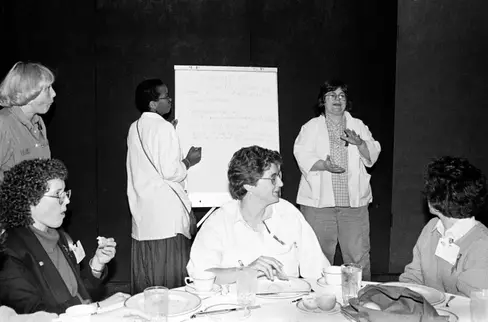OUR FOUNDER
Ellen Pence: An Agent of Change
Ellen Pence was more than a visionary; she was an indomitable force of change. The journey that culminated in the launch of Praxis in 1998 began in Minneapolis during the mid-1970s. As a housing advocate for the city, Ellen joined with a group of local practitioners and activists to form one of the first coalitions in the U.S. that would address what was then called the “battered women” problem. Throughout her lifetime, Ellen identified herself as a community organizer; she continually mobilized others to end gender-based violence — whether collaborating at the grassroots, engaging with the federal government, reforming local agency policies, joining with shelter advocates, connecting with survivors, or working with the Commandant of the U.S. Marine Corps. Ellen’s ability to infuse any gathering with good humor, inspiring analysis, and powerful storytelling was legendary.


As a founding member of Minnesota Program Development and the Duluth Domestic Abuse Intervention Project, Ellen helped lay the foundation for groundbreaking approaches to understanding and addressing the needs of survivors and their children. It was during her work in Duluth that Ellen co-created with staff, community groups, and most importantly survivors, the Power and Control Wheel. The Power and Control Wheel is now used throughout the world, adapted for numerous cultural contexts, and has been translated into more than 45 languages. Ellen and her agency partners in Duluth also implemented the first Coordinated Community Response (CCR) known as "The Duluth Model," forever reshaping how we confront and combat intimate partner violence in the U.S. and across the globe. At Praxis, Ellen continued to develop new approaches, helping to create frameworks for supervised visitation that prioritize the well-being of domestic violence survivors and their children.
Ellen's academic pursuits were equally groundbreaking. During her graduate career, she was introduced to renowned feminist sociologist Dorothy E. Smith and the field of institutional ethnography. This led Ellen to conduct pioneering research that would shed light on systemic shortcomings that marginalize survivor safety. She proposed forward-thinking solutions for reform, which paved the way for the development of Institutional Analysis and the Praxis Safety & Accountability Audit- an innovative tool for community-based research and organizing that empowers communities to reevaluate their responses to domestic violence. Institutional Analysis has been instrumental in assessing and addressing disparities in responses to gender-based violence, from the criminal justice system to child protective services, and inspired other notable initiatives such as the Blueprint for Safety (first launched in St Paul, MN).
Ellen's impact extended far beyond her research and work at Praxis. Her leadership in both the movement to end gender-based violence and institutional ethnography earned her numerous accolades, including the Dorothy E. Smith Scholar Activist Award in 2008. She was a prolific speaker, trainer, collaborator, and writer, producing a wealth of publications and resources that continue to guide the movement.
Throughout her career, Ellen never departed from her true calling as an advocate and activist for social change. She dedicated her life to translating knowledge into meaningful and accessible tools for action in service to ending gender oppression. Ellen cultivated a practice of lifelong learning and action that was based not only on designing new responses and reforming existing approaches but also on always looking upstream at the root causes of discrimination and systemic disparities. One of her final and significant projects was collaborating with other long-time activists to create Praxis’s Advocacy Learning Center (ALC) to uplift the expertise of advocates, deepen their understanding, and galvanize them to propel the movement forward. The ALC was a nod to Ellen’s lifelong identity as an advocate and to her roots in movement building. It served as a reminder of the foundational principles of over 50 years of successful organizing—centering the needs of survivors, their children, and their communities. Today, the Advocacy Learning Center has evolved into Praxis’s vibrant learning communities.
Ellen Pence was more than a leader; she was a mentor, a friend, and a guiding light. Her creativity and curiosity continue to inform and inspire our work at Praxis, driving us to ask questions and provide solutions to challenge the status quo. We strive to embody her commitment to social change and advance her astute analysis of institutional responses. Together, we carry forward her legacy, as we continue to walk the path she helped pave.







